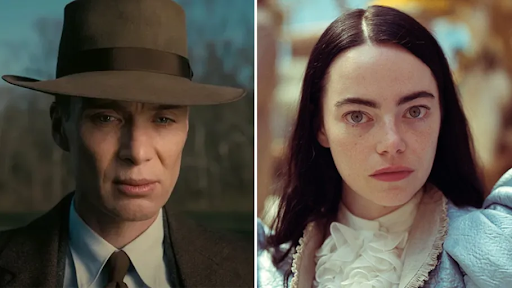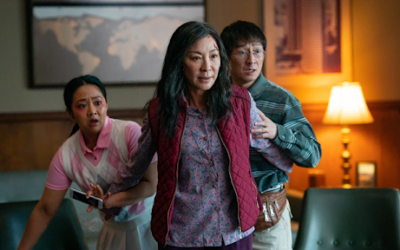Source: Variety
With less than a month left until the Academy Awards take place, many are more eager than ever to find out which of the previous year’s nominated features will go on to win the film industry’s most revered prizes, the most prestigious being the award for Best Picture. In the meantime though, there have been plenty of other awards ceremonies that have not only showered these films with even more accolades, but have also provided additional evidence as to what might end up winning at the Oscars. Among the most recent of these was held by the British Academy of Film and Television Arts (or BAFTA for short), which one could describe as the United Kingdom’s equivalent to the United States’ Academy of Motion Picture Arts and Sciences (AMPAS). Although the BAFTA Awards tends to focus a little more heavily on films made within its native Britain, they otherwise include many of the same categories featured in the Oscars and often end up nominating many of the same films. Because of this, the BAFTA Awards, not unlike such other ceremonies as the Golden Globes, tends to be viewed as something of a predictor of what’s to come at the Oscars, as several of the films that win here will often repeat this exact same success when returning to the country on the other side of the Atlantic. If that continues to be true with this most recent BAFTA Awards ceremony, then the outcome of certain categories may be all but set in stone (perhaps literally in regards to the Best Actress category).
Taking place on Sunday, February 18th, the 77th Annual British Academy Film Awards had quite a few memorable events occur throughout its hours-long proceedings. Host David Tennant opened the main show with a pre-recorded sketch loosely based on his television series “Staged”, and singer Sophie Ellis-Bextor performed her hit song “Murder on the Dancefloor”, which saw a increase in popularity following its usage in Emerald Fennell’s “Saltburn”. However, as is often the case, it was the awards and those who won them that served as the ceremony’s biggest highlights, and while there were quite a few films fortunate enough to pick up at least one prize before the night’s end, only a couple managed to secure a truly substantial number, with one in particular receiving Best Picture alongside its other wins, enough for it to become the single most awarded film of the evening. That film: Christopher Nolan’s epic biographical drama “Oppenheimer”.
Having already taken quite a few Best Picture awards from various different organizations over the past few months, “Oppenheimer” appears to be the major frontrunner and the film most likely to take the Oscar in just under three weeks. Its wins at BAFTA seem to have done very little to change that outcome; in fact, it’s probably made it even more likely. On top of the film winning Best Picture, “Oppenheimer”, having been nominated in thirteen categories altogether prior to the start of the ceremony, also managed to take home six additional awards: Best Director for Christopher Nolan, Best Actor for Cillian Murphy, Best Supporting Actor for Robert Downey, Jr., Best Cinematography, Best Editing, and Best Original Score. While one can’t yet guarantee that “Oppenheimer” will repeat all of these successes on Oscar night (Cillian Murphy faces some especially stiff competition from Paul Giamatti of “The Holdover”, who has managed to pick up many of the Best Actor awards that Murphy was unable to win himself), the film’s performance at the BAFTAs only further prove how Nolan and his collaborators have impressed the awards circuit to an astonishing degree. As long as that momentum remains strong, one shouldn’t be too shocked if “Oppenheimer” ends up repeating these successes (and perhaps even win some of the awards that it wasn’t able to win here) once the Academy Awards finally get underway.
If there is one film that might pull off an upset and hold “Oppenheimer” back from achieving a Best Picture win at the Oscars, it would probably be Yorgos Lanthimos’ science fantasy black comedy “Poor Things”, which came in second at the BAFTAs in terms of the number of awards won throughout. Though it was unable to beat “Oppeneheimer” for the Best Picture BAFTA, it was able to find success in five other categories, some of which it was in fact competing with Nolan’s film for. These include Best Actress for Emma Stone, Best Costume Design, Best Production Design, Best Makeup and Hair, and Best Special Effects. If “Poor Things” is unable to overcome the competition provided by “Oppenheimer” in some of the more highly sought-after Oscar categories, it should at least be able to find some relief in knowing that it should be able to win in some of the same categories it had won at the BAFTAs. Granted, even without “Oppenheimer” looming over it, “Poor Things” will still have to contend with “Killers of the Flower Moon” lead actress Lily Gladstone (who vys for the Best Actress award alongside Stone) and “Barbie” (which could take the Costume Design and Production Design awards), though hopefully such competition won’t be too great of a hindrance to its success.
Of course, with this being an awards ceremony held by a British institution, it would seem rather unusual if a film made within this country did not pick up multiple awards for its own. Such a predicament was fortunately averted, however, thanks to Jonathan Glazer’s historical drama “The Zone of Interest”, which exited the ceremony with a total of three BAFTAs won over the course of the evening. These include Outstanding British Film, Best Sound, and Best Film Not in the English Language (the film, despite being made in the predominantly English-speaking United Kingdom, is spoken entirely in German, Polish, and Yiddish). Many are predicting that “The Zone of Interest” will win the Oscars’ equivalent to the latter category – specifically Best International Feature, and while its odds may not be quite as strong in any of the other categories it’s nominated in (a total of five altogether), that won’t change the fact that it, much like both “Oppenheimer” and “Poor Things” were able to perform exceptionally well at this most recent British Academy Film Awards.




